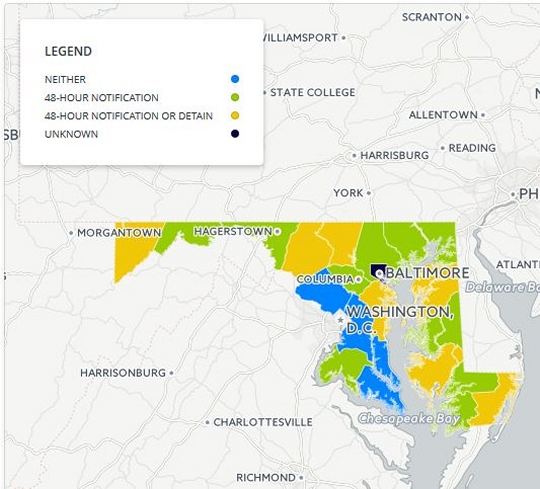 President Donald J. Trump issued an executive order Wednesday targeting jurisdictions that do not fully cooperate with the federal government to enforce immigration law. Immigrant rights groups and city and county officials were scrambling Thursday to fully understand how the order to deny federal funds to "sanctuary cities" could affect them. At present, some counties in Maryland do much more than others to help federal immigration agents apprehend undocumented immigrants. For example, in Frederick County, corrections officials will give the Dept. of Homeland Security 48 hours notice before releasing someone suspected of being an undocumented immigrant -- or hold them for 48 hours beyond their official release date. But Prince George's County, for example, doesn't comply with such requests.Source: Immigrant Legal Resource Center. (By Amanda Smith and Jack Paciotti.)
President Donald J. Trump issued an executive order Wednesday targeting jurisdictions that do not fully cooperate with the federal government to enforce immigration law. Immigrant rights groups and city and county officials were scrambling Thursday to fully understand how the order to deny federal funds to "sanctuary cities" could affect them. At present, some counties in Maryland do much more than others to help federal immigration agents apprehend undocumented immigrants. For example, in Frederick County, corrections officials will give the Dept. of Homeland Security 48 hours notice before releasing someone suspected of being an undocumented immigrant -- or hold them for 48 hours beyond their official release date. But Prince George's County, for example, doesn't comply with such requests.Source: Immigrant Legal Resource Center. (By Amanda Smith and Jack Paciotti.)WASHINGTON (Jan. 27, 2017)—Two Howard County Council members plan to push forward with legislation to declare their county a sanctuary for illegal immigrants ("undocumented" in politically-correct parlance), even after President Donald Trump announced his intention to crack down on such jurisdictions.
Fulfilling one of many immigration-related campaign promises, Trump on Wednesday signed an executive order that will cut federal funding from localities that don't cooperate with U.S. Immigration and Customs Enforcement.
The Howard County Council still is expected to vote as early as Feb. 6 on a bill that would designate Howard County a "sanctuary county."
The proposed legislation, co-sponsored by Councilman Calvin Ball and Councilwoman Jen Terrasa, would mostly codify practices Howard County already employs with regard to undocumented immigrants. It would ban county employees—including police officers and elected officials—from enforcing federal immigration law, assisting immigration officers in gathering information, and inquiring into people's immigration status.
The legislation also states the policy would not apply if it was in conflict with federal law.
With Trump's threat looming, Ball said the bill is even more important than before.
"Given the fear and concern in our community from undocumented immigrants, our friends, our neighbors…this is a vital community conversation to have at this point in time," he said. "We're at a crossroads. We have to decide what kind of community we're going to be."
And although the bill doesn't represent dramatic changes in policy, Ball said there is value in having a "written policy that people can see and does not change without a public, transparent process."
County Executive Allan Kittleman called the legislation a "hollow political statement" and said he would use his veto power should it pass.
"I am not willing to jeopardize existing programs and services which benefit all Howard County residents to adopt a label that would not change any of the policies and practices that we already have in place," Kittleman said in a statement
The bill could also "compromise public safety efforts," he said, as the county has had success working with ICE to target drug activity, human trafficking and child pornography.
Ball said it is unclear if Trump's executive order would already impact the county, given the policies currently in practice.
With many questions still unanswered, Ball said the council is working to evaluate the executive order's implications, adding that Howard County does not receive "significant federal funding."
In two public hearings since the bill was introduced Jan. 3, residents have come forward on both sides of the issue.
"It has really blown away the usual input we get from the public," said county council public information officer Eric Solomon, noting that one hearing went until the early hours of the morning.
Those opposed expressed fear that the "sanctuary" designation would negatively affect the economy and lead to higher crime rates. Some cited the case of Kate Steinle, a woman who was killed in 2015 by an undocumented immigrant in San Francisco, a sanctuary city.
Trump ordered his administration to "make public a comprehensive list of criminal actions committed by aliens and any jurisdiction that ignored or otherwise failed to honor any detainers with respect to such aliens."
The Center for American Progress released a report Thursday that found there are an average of 35.5 fewer crimes committed per 10,000 people in sanctuary counties as opposed to non-sanctuary counties.
Howard County residents who testified in favor of the bill urged council members to affirm their values of inclusion.
A spokeswoman for immigrant advocacy group CASA said Howard County council members should continue their fight to become a "sanctuary county."
"They should stand on their strong principles," said Fernanda Durand, "their principles that are about compassion and keeping their cities safe."


